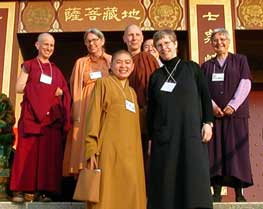Advice for newcomers to the Dharma

I remember well my initial years in the Dharma, trying to figure out how I was supposed to act in Dharma centers, in monasteries, and with monastics. Figuring out what to study and practice was no easier. And learning to work with my mind was the greatest challenge of all! Sometimes I felt like just dropping it all and spacing out with my favorite distraction. But having made it through those challenging times, I’ll pass on some tips to those who are newcomers.
When you go to a Dharma center, talk to the person at the door, ask if there is a brochure on etiquette, and pick up a prayer book to use during the class. If there’s no one at the door, ask someone who knows their way around the center, or even speak to another newcomer. People are usually friendly. During Q&A time, ask questions. No question is “stupid.” In fact, chances are several other people in the room are wondering the same thing and hope that someone will overcome their shyness enough to ask the teacher.
You’ll see people bowing. If you don’t feel comfortable doing that, don’t. There’s no pressure. Same with saying prayers; take your time to understand them so you feel comfortable when reciting them.
As a beginner, go to the classes for beginners. Although the center may be hosting initiations by well-known teachers, wait to attend those until you have established a proper foundation in the lamrim (gradual path to enlightenment) and lojong (thought transformation). Learn how to calm your mind and work with your afflictive emotions before delving into more complex practices. If you skip around from one class to another or frequently miss classes, you will miss learning the important steps. The importance of properly understanding basic Buddhist principles and establishing a solid foundation at the beginning can’t be overestimated.
You’ll hear many new ideas, some of which may not make sense to you. That’s ok. You don’t need to force yourself to believe them or to discard them as ridiculous. Instead, put them on the back burner and return to contemplate them from time to time. Gradually things will begin to make sense.
Don’t expect to understand or actualize everything all at once. It takes years, lifetimes, eons. Learning Dharma is not like Western education, where we learn facts and tell the teacher what they already know on a test. Listen attentively to the Dharma and at home, think about what you heard. Check it out logically and apply it to your life to see if it works. Listen to the same teaching many times, because each time you hear it, it will sound different because your mind has changed. Read Dharma books slowly, pausing to contemplate what you read, applying it to your mind. Although it’s tempting to hurry to get a lot of information, especially about exotic practices, principally read books that correspond with your level of practice. In this way, you’ll establish a good foundation and won’t become confused.
Buddhism isn’t intellectual concepts. Practice is essential to bring the Dharma into your heart. This entails setting up a regular daily meditation practice and sticking to it. Only by making meditation a part of your daily life routine will you experience its benefits. Making an appointment with the Buddha by writing it into your daily calendar will help you get to the cushion. If someone calls and asks you to do something else at that time, you can truthfully say, “Sorry, I’m busy.” We don’t break appointments with important people like the Buddha.
In your daily meditation practice, begin with reciting some verses to establish your motivation and make your mind receptive. Then do checking (analytical) meditation on the topics you learned in Dharma class. This formal time of meditation prepares you for practicing the Dharma the rest of your day—at work, with your family, at school, wherever. In those situations, be aware of what you’re thinking, feeling, saying, and doing. Be mindful of your bodhicitta motivation and try to bring love and compassion into all your interactions with others. In the evening, review your day, congratulate yourself for what you did well, admit and regret when you made mistakes, and renew your compassion for the next day.
When you first begin to practice, you may be shocked at the thoughts and feelings you discover inside. Don’t get discouraged, thinking the path is too difficult or getting down on yourself. All of us are similar; anyone who has practiced Dharma for a while has gone through what you’re experiencing and has come out the other end. Be patient with yourself.
Don’t get lost in the trappings. Dharma is about transforming our minds. Tibetan Buddhism has many fascinating external things—high thrones, deep chanting, colorful brocade, and pujas—but these are only aids. Real practice is about working with our mind.
There’s no rush to find a teacher. Buddhist scriptures instruct us to check out someone’s qualities before taking them as our teacher. In the meantime, continue attending Dharma class and practice what you learn. Go slowly: take refuge and precepts and form a teacher-student relationship when you’re ready. Sometimes an emotional feeling may suddenly surge up to do this, but it’s wiser to wait a while until your understanding is stable.
Cultivate friendships with people who are also practicing the Dharma. In this way, you encourage each other to learn and practice. One way to meet people is to volunteer at the Dharma center. Start with a small job, and remember that your Dharma practice is most important, so don’t take on more volunteer work than you can handle.
We get out what we put into the Dharma. We’re responsible for our own spiritual practice. No one is going to spoon-feed us. Our teachers and the Three Jewels are there to guide, teach, and inspire us, but we have to do the work of transforming our minds. As we do, we become wiser, calmer, more compassionate, and clearer, and our sense of well-being increases.
Venerable Thubten Chodron
Venerable Chodron emphasizes the practical application of Buddha’s teachings in our daily lives and is especially skilled at explaining them in ways easily understood and practiced by Westerners. She is well known for her warm, humorous, and lucid teachings. She was ordained as a Buddhist nun in 1977 by Kyabje Ling Rinpoche in Dharamsala, India, and in 1986 she received bhikshuni (full) ordination in Taiwan. Read her full bio.


